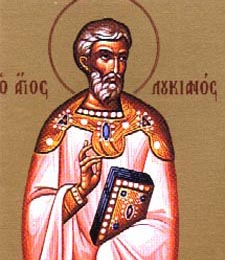Arianism
Shortly after the beginning of the Donatist schism, the Arian controversy arose. Arius, an Alexandrian presbyter, began teaching some time before 318 that the Logos, the Word of God who became man—Jesus Christ—is not the divine Son of God. For Arius, the Son of God is not the pre-existent, eternally existing, uncreated Second Person of the Holy Trinity, but a created being—created out of nothing, like everything else, by God the Father.
According to Arius, God is not the uncreated Holy Trinity. Rather, God is the Father, the Creator, alone. For Arius, God the Father created His Logos, or Word, or Son, as the first and greatest of His creatures. This Logos then earned the right to be worshiped as God because of His constant devotion to the Father. Thus the Son became God’s instrument for the salvation of the world, being born as the man Jesus. Hence, for Arius, Jesus Christ is not the uncreated, divine Son of God having exactly the same uncreated divine nature that God the Father has. Rather, He is a created being, as is the Holy Spirit.

Saint Alexander, Bishop of Alexandria (r. 312–328), tried to convince Arius to stop this teaching that directly subverted the Bible and the traditional teaching and worship of the Church. But Arius refused to desist. Instead, he appealed far and wide for support. He found his most powerful ally in Eusebius, Bishop of Nicomedia, his former classmate in the Christian school at Antioch led by Saint Lucian (d. 312). Ironically, it was this Arian-sympathizing Bishop Eusebius who eventually became the court theologian to Emperor Constantine in his later years, and who baptized him on his deathbed in 337.
